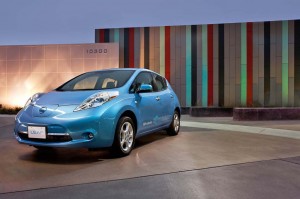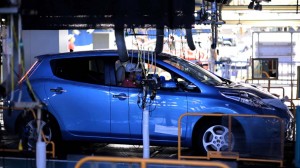Nissan has laid out a six-year plan to become the world’s leading “green” automaker, with a target of selling a cumulative 1.5 million zero-emissions vehicles by 2017 in partnership with French automaker Renault.
Nissan launched its push late in 2010 with the debut of the Leaf battery-electric vehicle, with Renault set to begin production of its own BEVs in the months ahead. While sales are expected to barely nudge 20,000 this year, the makers are rapidly ramping up capacity and by mid-decade will be able to produce as many as 450,000 battery cars annually worldwide.
During a news conference in Tokyo today Carlos Ghosn, who serves as CEO of both makers, announced that the plan calls for Nissan boosting the fuel economy of its typical vehicle 35% compared to 2005 levels. It also aims to reduce overall CO2 emissions by 20% by 2017.
“More consumers are demanding products in line with their values, including cars and trucks with a lower carbon footprint,” said Ghosn.
“At the same time, we are using technology to make our factories greener and more efficient. Nissan wants to be part of the solution toward a sustainable society – for the sake of the planet and as a significant competitive advantage and a strategic differentiator in the global manufacturing sector.”
The 6-year plan isn’t entirely altruistic. Ghosn is convinced that being seen as a leader in the environmental space can draw in more buyers. Its arch-rival Toyota has clearly benefited from the green aura it has crafted for itself with the Prius hybrid – and is now spreading that brand name to several additional models it is adding to its line-up.
The challenge, however, is that consumers want greener products but aren’t necessarily willing to pay more for them, Ghosn has cautioned on several occasions. That is a problem it – and its competitors – faces as it tries to market costly battery-electric models like Leaf.
Nissan has already indicated plans to add more BEVs to its line-up, nonetheless, including an electric vehicle that will be sold through its up-market Infiniti division.
But the Japanese maker also plans to target other new environmentally friendly automotive segments, with a plug-in hybrid under development for launch during the 2017 fiscal year. The maker is also working on other green technologies, noted Ghosn, including hydrogen fuel-cell vehicles and clean diesels.
Nissan was actually late to enter the green automotive space, Ghosn reluctant to embrace conventional hybrid technology. It initially licensed Toyota’s technology for a limited-edition Altima hybrid model but has since developed its own gas-electric driveline.
Its ambitious goal won’t be easy to attain. It remains to be seen whether consumers will actually embrace battery-electric technology. Through the end of September Nissan had sold a total of 16,000 of the Leaf electric sedans worldwide. High costs and limited range are generally seen as a challenge to turning such vehicles into truly mainstream offerings.
(Ford, Toyota, VW honored for environmental leadership. Click Here for more.)
Even so, virtually every automaker is now offering a conventional hybrid, with most developing plug-ins and pure battery-electric vehicles of their own. Chevrolet’s Volt plug-in is seen by many as a direct competitor to the Leaf, while Toyota and Ford are bringing out a mix of plug-ins and BEVs over the next two years. Even luxury makers like Mercedes-Benz and BMW are entering the green market, the latter recently introducing an all-new line-up of battery-electric and plug-in models including the i3 and i8.


